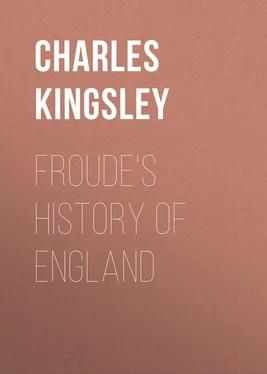Charles Kingsley - Froude's History of England
Здесь есть возможность читать онлайн «Charles Kingsley - Froude's History of England» — ознакомительный отрывок электронной книги совершенно бесплатно, а после прочтения отрывка купить полную версию. В некоторых случаях можно слушать аудио, скачать через торрент в формате fb2 и присутствует краткое содержание. Издательство: Иностранный паблик, Жанр: foreign_prose, История, foreign_edu, foreign_antique, на английском языке. Описание произведения, (предисловие) а так же отзывы посетителей доступны на портале библиотеки ЛибКат.
- Название:Froude's History of England
- Автор:
- Издательство:Иностранный паблик
- Жанр:
- Год:неизвестен
- ISBN:нет данных
- Рейтинг книги:5 / 5. Голосов: 1
-
Избранное:Добавить в избранное
- Отзывы:
-
Ваша оценка:
- 100
- 1
- 2
- 3
- 4
- 5
Froude's History of England: краткое содержание, описание и аннотация
Предлагаем к чтению аннотацию, описание, краткое содержание или предисловие (зависит от того, что написал сам автор книги «Froude's History of England»). Если вы не нашли необходимую информацию о книге — напишите в комментариях, мы постараемся отыскать её.
Froude's History of England — читать онлайн ознакомительный отрывок
Ниже представлен текст книги, разбитый по страницам. Система сохранения места последней прочитанной страницы, позволяет с удобством читать онлайн бесплатно книгу «Froude's History of England», без необходимости каждый раз заново искать на чём Вы остановились. Поставьте закладку, и сможете в любой момент перейти на страницу, на которой закончили чтение.
Интервал:
Закладка:
Whether or not Mr. Froude would agree with these notions, he is more or less responsible for them; for they have been suggested by his ‘History of England from the Fall of Wolsey to the Death of Elizabeth.’ It was impossible to read the book without feeling the contrast between its tone and that of every other account of the times which one had ever seen. Mr. Froude seems to have set to work upon the principle, too much ignored in judging of the past, that the historian’s success must depend on his dramatic faculty; and not merely on that constructive element of the faculty in which Mr. Macaulay shows such astonishing power, but on that higher and deeper critical element which ought to precede the constructive process, and without which the constructive element will merely enable a writer, as was once bitterly but truly said, ‘to produce the greatest possible misrepresentation with the least possible distortion of fact.’ That deeper dramatic faculty, the critical, is not logical merely, but moral, and depends on the moral health, the wideness and heartiness of his moral sympathies, by which he can put himself—as Mr. Froude has attempted to do, and as we think successfully—into the place of each and every character, and not merely feel for them, but feel with them. He does not merely describe their actions from the outside, attributing them arbitrarily to motives which are pretty sure to be the lowest possible, because it is easier to conceive a low motive than a lofty one, and to call a man a villain than to unravel patiently the tangled web of good and evil of which his thoughts are composed. He has attempted to conceive of his characters as he would if they had been his own contemporaries and equals, acting, speaking in his company; and he has therefore thought himself bound to act toward them by those rules of charity and courtesy, common alike to Christian morals, English law, and decent society; namely, to hold every man innocent till he is proved guilty; where a doubt exists, to give the prisoner at the bar the benefit of it; not to excite the minds of the public against him by those insinuative or vituperative epithets, which are but adders and scorpions; and, on the whole, to believe that a man’s death and burial is not the least reason for ceasing to behave to him like a gentleman and a Christian. We are not inclined to play with solemn things, or to copy Lucian and Quevedo in writing dialogues of the dead; but what dialogues might some bold pen dash off between the old sons of Anak, at whose coming Hades has long ago been moved, and to receive whom all the kings of the nation have risen up, and the little scribblers who have fancied themselves able to fathom and describe characters to whom they were but pigmies! Conceive a half-hour’s interview between Queen Elizabeth and some popular lady-scribbler, who has been deluding herself into the fancy that gossiping inventories of millinery are history . . . ‘You pretend to judge me, whose labours, whose cares, whose fiery trials were, beside yours, as the heaving volcano beside a boy’s firework? You condemn my weaknesses? Know that they were stronger than your strength! You impute motives for my sins? Know that till you are as great as I have been, for evil and for good, you will be as little able to comprehend my sins as my righteousness! Poor marsh-croaker, who wishest not merely to swell up to the bulk of the ox, but to embrace it in thy little paws, know thine own size, and leave me to be judged by Him who made me!’ . . . How the poor soul would shrink back into nothing before that lion eye which saw and guided the destinies of the world, and all the flunkey-nature (if such a vice exist beyond the grave) come out in utter abjectness, as if the ass in the fable, on making his kick at the dead lion, had discovered to his horror that the lion was alive and well—Spirit of Quevedo! finish for us the picture which we cannot finish for ourselves.
In a very different spirit from such has Mr. Froude approached these times. Great and good deeds were done in them; and it has therefore seemed probable to him that there were great and good men there to do them. Thoroughly awake to the fact that the Reformation was the new birth of the British nation, it has seemed to him a puzzling theory which attributes its success to the lust of a tyrant and the cupidity of his courtiers. It has evidently seemed to him paradoxical that a king who was reputed to have been a satyr, instead of keeping as many concubines as seemed good to him, should have chosen to gratify his passions by entering six times into the strict bonds of matrimony, religiously observing those bonds. It has seemed to him even more paradoxical that one reputed to have been the most sanguinary tyrant who ever disgraced the English throne should have been not only endured, but loved and regretted by a fierce and free-spoken people; and he, we suppose, could comprehend as little as we can the reasoning of such a passage as the following, especially when it proceeds from the pen of so wise and venerable a writer as Mr. Hallam.
‘A government administered with so frequent violations, not only of the chartered privileges of Englishmen, but of those still more sacred rights which natural law has established, must have been regarded, one would imagine, with just abhorrence and earnest longings for a change. Yet contemporary authorities by no means answer this expectation. Some mention Henry after his death in language of eulogy;’ (not only Elizabeth, be it remembered, but Cromwell also, always spoke of him with deepest respect; and their language always found an echo in the English heart;) ‘and if we except those whom attachment to the ancient religion had inspired with hatred to his memory, few seem to have been aware that his name would descend to posterity among those of the many tyrants and oppressors of innocence whom the wrath of Heaven has raised up, and the servility of man endured.’
Конец ознакомительного фрагмента.
Текст предоставлен ООО «ЛитРес».
Прочитайте эту книгу целиком, на ЛитРес.
Безопасно оплатить книгу можно банковской картой Visa, MasterCard, Maestro, со счета мобильного телефона, с платежного терминала, в салоне МТС или Связной, через PayPal, WebMoney, Яндекс.Деньги, QIWI Кошелек, бонусными картами или другим удобным Вам способом.
Интервал:
Закладка:
Похожие книги на «Froude's History of England»
Представляем Вашему вниманию похожие книги на «Froude's History of England» списком для выбора. Мы отобрали схожую по названию и смыслу литературу в надежде предоставить читателям больше вариантов отыскать новые, интересные, ещё непрочитанные произведения.
Обсуждение, отзывы о книге «Froude's History of England» и просто собственные мнения читателей. Оставьте ваши комментарии, напишите, что Вы думаете о произведении, его смысле или главных героях. Укажите что конкретно понравилось, а что нет, и почему Вы так считаете.












